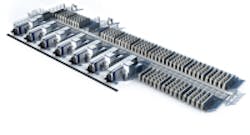KAI Korea Aerospace Industries Ltd. is banking on an automated machining system to increase production volume when alternating between setups and machining. The system consists of seven high-performance machining centers, along with a rail-guided transport system with three loading and unloading stations. Sixty storage stations will link the seven machines.
KAI Korea Aerospace, in Sacheon City, South Korea, ordered seven Ecospeed F machining centers from Dorries Scharmann Technologie (DST) GmbH. The milling centers will be used to machine the wing ribs on the Airbus A 350 XWB.
With Sprint Z3 parallel kinematic machining heads made for cutting aluminum aircraft structures, the machines accommodate workpiece sizes up to a maximum of 2,000 mm by 6,000 mm. C axes are incorporated into the machine heads for positioning during angular drilling and milling.
The heads allow the machines to remove material at any dihedral angle between -130 degrees and +130 degrees, and the heads use tool interfaces as main spindles and can be interchanged automatically. This means that with 5-sided machining, the Ecospeed Fs offer more complex options than conventional milling machines, with interference contours between tool shafts and machining heads of only 50 mm.
Ecospeed F 120-kW spindles run at 30,000 rpm with maximum torques of 83 Nm. This, combined with Sprint Z3 heads, allows for higher feedrates than conventional machines, reported DST. Each machine also features a rack-type tool magazine with 125 positions, a vacuum workpiece clamping system, video monitoring and Siemens Sinumerik 840 D control system.
DST will deliver the first Ecospeed F to South Korea in November 2009, and the last in January 2014.
